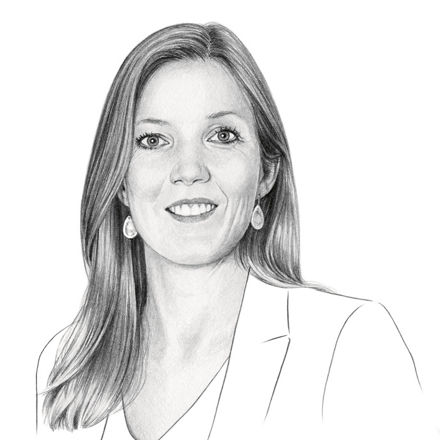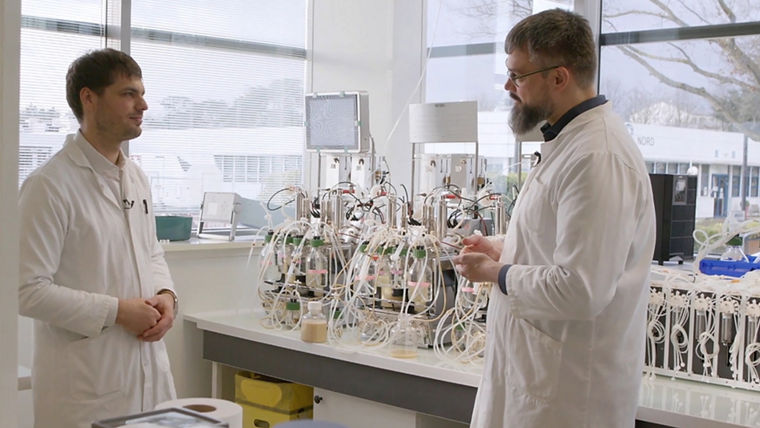As you head southward from Paris on a regional train, it takes you just under one hour to reach the small station “Le Bras de Fer.” When you get off the train here, you are greeted by billboard-sized photos of laboratory scenes announcing the Genopole biotechnology park, which is within walking distance. Sixty-five companies are based there, one of which is Abolis. Founders Valérie Brunel and Cyrille Pauthenier receive visitors in their office. “It’s still quite sparse here,” apologizes Pauthenier, “We only rented this wing a few weeks ago.”
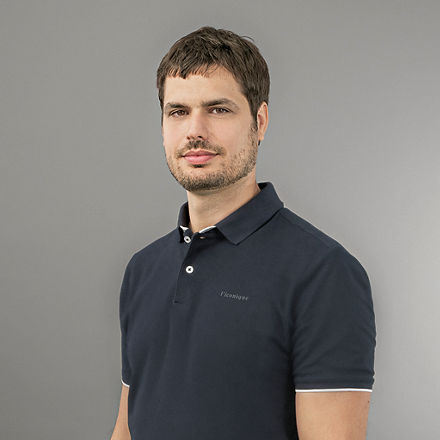
»Abolis aims to help satisfy the needs of our society without jeopardizing its future.«
Cyrille Pauthenier Co-Founder and CEO of Abolis
The goal: to make the chemical industry more sustainable
Fifty-five employees currently work at Abolis, and this number is set to double over the course of the year. The biologists, software engineers, experts in robotics and fermentation, bioinformaticians, and IT professionals that work here all have one goal: They want to help the chemical industry become more sustainable with biobased ingredients. They do this by inducing microorganisms to produce substances that would otherwise have to be extracted in a much more complex way. “Abolis aims to help satisfy the needs of our society without jeopardizing its future,” says Pauthenier, summarizing his company’s vision.
To come a step closer to this vision, the company has entered into a strategic partnership with Evonik and the cosmetics manufacturer L’Oréal. Thomas Satzinger, the industrial engineer who is responsible for the strategic orientation of Evonik’s business with care products and ingredients for cosmetics, played a key role in driving the project forward. “We have ambitious goals for the transformation of our portfolio. On the one hand, we want to increase the proportion of our specialties and on the other we want to become more sustainable. Biosourced raw materials that require less agricultural land, for example, play a decisive role here. Thanks to its biobased products, Abolis was a perfect fit.”

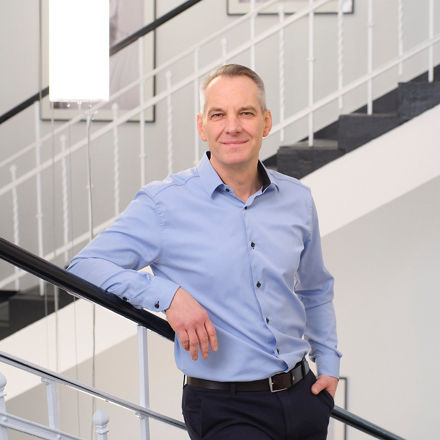
»We have ambitious goals: we want to increase the proportion of our specialties and become more sustainable.«
Thomas Satzinger Vice President Strategy Evonik Care Solutions
Abolis can accelerate the research and development of innovative biomanufacturing and microbiome solutions thanks to the investment of an international consortium last July that includes, among others, BOLD, L’Oréal’s Corporate venture capital fund, the DeepTech & Climate Fund, and Evonik Venture Capital.
Sustainability in the cosmetics sector is about much more than just CO2 emissions. In order to make shampoo, make-up, and skincare products more resource-efficient and environmentally friendly, manufacturers need to consider the selection of raw materials and the way the products are formulated as well as how they are used in the consumer’s bathroom. The cosmetics industry is committed to improving its entire value chain by addressing multiple key areas. These include issues such as the conversion of environmentally valuable land, the type of cultivation, and fair working conditions in agriculture.
Stricter requirements, more demand
The efficient use of raw materials in the production of cosmetics is just as important as the biodegradability of the cosmetic products themselves. Through innovative eco-design principles, manufacturers are striving to optimize product usage by consumers, reducing packaging material and energy consumption.
The sustainability of cosmetic products plays an important role for more and more consumers. The analysis company Straits Research estimated the volume of the market for biobased cosmetic and personal care ingredients at more than 5.2 billion US dollars in 2023. It is expected to rise to more than 8.6 billion US dollars by 2032. “The legal requirements have become stricter and our customers are also increasingly selecting ingredients based on environmental criteria,” confirms Satzinger. “For several years, Evonik has been using targeted enzymes to produce cosmetic oils in order to make a significant contribution to reducing emissions from cosmetics. At first, only a few customers wanted them. Today, they are in high demand.” Most of the ingredients for cosmetics that Evonik produces are now biodegradable, says Satzinger. “New products must meet this criterion from the outset.”
The performance must also be right
However, responsible handling of valuable plant resources and their environmentally friendly processing are not enough by themselves, he emphasizes: “The performance of a product must also be right.” The best example of this is glycolipids, which also include rhamnolipids. These biosurfactants are both skin-friendly and powerful cleaners as well as being extremely biodegradable. In 2024, rhamnolipid production started at a new plant in Slovakia, making Evonik the world’s first company to produce biosurfactants on an industrial scale—a milestone on the road to greater sustainability.
Evonik does not develop every process on its own. Where it makes sense, Evonik invests in companies that have acquired expert knowledge in their respective fields. Around a dozen companies are thus expanding the portfolio of solutions (see info at the end): Dr. Straetmans from Hamburg, for example, contributes expertise in preservation, while Botanica from Switzerland and Novachem from Argentina contribute plant extracts.


A workbench and a set of pipettes at the beginning
Further progress might now be achieved by a collaboration between Abolis, Evonik, and L’Oréal. The three partners want to produce ingredients using biotechnology in the future. Satzinger explains how this cooperation will work: “If L’Oréal needs an ingredient for a product, Abolis will develop its biotechnological solution in the laboratory. If the process works on a small scale, Evonik will take it over and transfer it to larger systems for industrial production.”
The founders of Abolis are well-versed in the biobased production of molecules: Valérie Brunel, 54, is a chemist and expert in innovation management, while Cyrille Pauthenier, 36, is a chemist and biologist. “We met in 2013, when Cyrille was an ambitious young researcher with an entrepreneurial spirit and Abolis was nothing more than a PowerPoint presentation,” says Brunel. The fact that Abolis joined the Genopole research campus made the start easier: “In the beginning, we only had a workbench, an office, and a set of pipettes. We were able to borrow a lot of the super-expensive equipment we needed here,” says Brunel.
In the first ten years, says Brunel, they only raised one million euros, “which is not much for a biotech-company.” The State, which supports young French companies, provided startup assistance in the form of grants. “But we had sales right from the start and managed to run the company with as few expenses as possible.” The fact that they could lease equipment also helped. The first collaborations with large companies, such as pharma group Servier, cheese manufacturer Bel, food group Lesaffre and, in 2019, L’Oréal, were established after just a few years.
Yeasts take over production
Abolis now has its own equipment. And that, says Pauthenier, is one of his company’s four treasures, “alongside the data, the employees, and our yeast strains.” The yeast strains’ genome is modified by Abolis so that they produce a desired product from simple starting materials such as sugar. The process is similar to brewing beer, in which yeast converts malt sugar into alcohol through fermentation—except that the yeast fungi at Abolis are programmed to produce other substances.
The genetic engineering of yeasts is Abolis’ core competence, say the founders. However, they emphasize that they are not discovering new active ingredients but merely finding new ways to produce already known molecules in a more resource-efficient way, or molecules that could only be produced by biotechnology. “Sometimes, for example, the cosmetics industry is interested in a substance that is only found in minute quantities in a particular plant,” says Pauthenier. “Growing millions of tons of it for industry and extracting the molecule from it makes no ecological sense and is often impossible in practice. However, using our yeasts, we can develop a method to do it with a smaller footprint. In this way, we also bring to life active ingredients that could not otherwise have been produced on a large scale.” Biotechnological production can replace chemical production, conserve fossil sources or rare resources and, according to Pauthenier, is more stable and more easily scalable than natural plant growth.

A long way to go
But there is a long way to go before the yeasts produce what they are supposed to. It begins in the computer science and modeling department at Abolis. Here, engineers develop sequencing software, maintain the databases, control the robots in the laboratory and back up the genome data. The experts have to keep an eye on all kinds of imponderables, such as ensuring that the yeasts do not poison themselves with the product they are making. If Abolis considers the production of a substance by a strain to be feasible, employees in the laboratory implement what the IT experts have previously worked out.
Flasks with blue lids and clear yellowish liquid circle in shaking incubators, centrifuge tubes are arranged in an orderly fashion on the workbenches, and plates with culture media are stacked next to them. An employee in a white coat and gloves carefully pipettes a clear liquid into small reaction vessels with plastic lids. It looks like a classical biotechnology laboratory. “The difference is in these tubes,” says Abolis co-founder Pauthenier, pointing to the liquid in the reaction vessels.

Up to 600 samples in one day
Next comes a room kept at a constant temperature of 19 degrees Celsius. Several high-throughput mass spectrometers analyze samples simultaneously, and an automatic pipetting and sample processing station does its work. “This is where it’s decided whether a yeast strain created in the laboratory is good enough to be taken further in our fermentation process,” explains Pauthenier.
One floor down, three robots stand in a light-flooded room: One of these robots can completely automatically dilute up to 96 samples simultaneously—much faster and more precisely than a human. A second one isolates and purifies DNA. It can handle up to 600 samples in one working day and uses very little disposable material such as pipette tips. Finally, the third robot is specialized in distributing reagents onto plates, among other things. “You can buy a few robots quickly,” says Pauthenier. “But programming them so that they run as they should takes years.” It’s a task that the IT experts at Abolis are taking on.
One of these experts is working on his laptop next to the latest device: Behind a glass pane, a gripper arm moves reagent vials back and forth. The device costs around 350,000 euros and is intended to categorize yeast strains in the future. Pauthenier sees robotics and artificial intelligence as a valuable addition to his team’s skills, no more and no less. “They cannot replace human creativity and intuition,” he says.
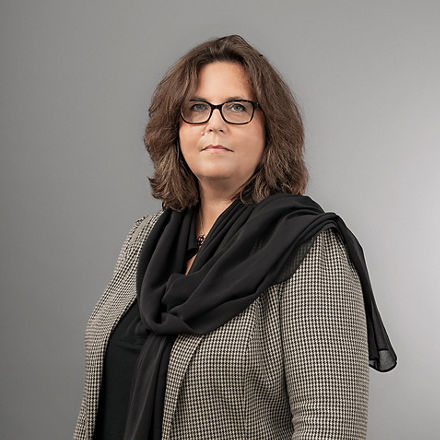
»Together with L’Oréal and Abolis, we can cover the entire value chain.«
Valérie Brunel Co-Founder & General Manager Abolis
More than the sum of its parts
The recently concluded industrial partnership offers Abolis a huge opportunity. The biotechnology specialists from south of Paris have been working with the Beauty giant L’Oréal’s R&I for five years. However, the three-way constellation with Evonik offers new opportunities: “The three of us can cover the entire value chain,” says Abolis co-founder Brunel enthusiastically. There was always this gap before: “We talked to L’Oréal about new ingredients, but we can’t produce them in large quantities. So we brought Evonik on board as a third partner.”
Brunel and Pauthenier also see Evonik as a pioneer in microbiome research, particularly for animal health. “The animal microbiome is an area in which we are also developing expertise that could complement Evonik’s work.”

Guillaume Climeau, Head of Business Development and Alliance Management at L’Oréal R&I, also has high hopes for the cooperation: “Abolis has the biotechnological expertise, we are familiar with the formulation and the consumers, and Evonik has unique expertise in the industrialization of the processes developed by Abolis.” The Beauty group is expanding its portfolio with biobased ingredients and is confident of achieving results more quickly through new forms of collaboration. “Whenever we jointly build something in a creative encounter, one plus one plus one equals more than three,” says Climeau (read also the interview).
Made for bigger things
At the last station, the fermentation laboratory, Abolis co-founder Pauthenier shows what this means for collaboration at the Genopole research campus. Here, the yeasts prove that they can handle production volumes of up to 20 liters.
Evonik then takes over the process and starts production on a larger scale with the yeasts from France. To ensure that the scaling up is successful, the experts from Evonik have already been closely involved in the development process.
ELEMENTS-Newsletter
Receive exciting insights into Evonik's research and its social impact - conveniently by e-mail.
“Simply throwing the results over the fence when one side is finished doesn’t work. We are in contact with Abolis from the outset in order to identify at an early stage which steps need to be taken to optimize the manufacturing process,” explains Thomas Satzinger. At Evonik, the choice of manufacturing location depends on the desired product—but one important location is certainly the biotech hub in Slovenská Ľupča, Slovakia, with its decades of experience in fermentation and the downstream purification process.
It won’t be long before the first L’Oréal products containing biotechnologically produced molecules from Abolis and Evonik will be on the shelves of retailers worldwide. “I would expect to see the first successes of our collaboration in a few years,” says Satzinger. Abolis founder Cyrille Pauthenier is looking forward to this: “It’s very meaningful to do something that is scientifically exciting and challenging, that is economically and socially useful, and that also helps the environment. From a global perspective, we may only be a small stone, but even small stones can set big things in motion.”
From Plant-Based Cholesterol to Alternative Preservatives
How Evonik strengthens its expertise in biocosmetics through company purchases. A selection of key acquisitions:
2017 – Dr. Straetmans: Northern German Preservation Ideas
Preservatives in cosmetics protect the formulation and reduce the risk of microorganisms multiplying in creams or lotions. The Hamburg-based company Dr. Straetmans, founded in 1984, which Evonik acquired over seven years ago to strengthen its position in the cosmetics industry, is an expert in alternative preservation systems. The site is set to be developed into a globally recognized center of competence for alternative preservatives. Unlike conventional preservatives, these alternatives not only maintain the quality of a product but also serve additional functions, such as providing moisture to the skin. The use of these alternative preservation systems is complex; accordingly, Dr. Straetmans’ experience has also enhanced formulation expertise at Evonik.
2020 – Wilshire Technologies: Phytochemistry from the USA
The research and development conducted at Wilshire Technologies significantly expands Evonik’s range of natural ingredients. Phytochemicals, such as plant-based cholesterol and essential oils, are the specialty of this biotechnology firm, which was founded in 1997 in Princeton, New Jersey. Wilshire Technologies has made a name for itself in green chemistry, producing bioactive ingredients for the pharmaceutical and food industries. Founder Joe San Filippo was previously a chemistry professor at Rutgers University in New Jersey.
2021 – Botanica: Swiss Plant Expertise
For over three years, Botanica has been part of Evonik. Like the other specialized companies mentioned, Botanica is integrated into the Care Solutions business line. Since 1998, the Swiss company has specialized in extracting ingredients for the personal care industry from flowers, leaves, buds, fruits, roots, or bark -available as extracts, tinctures, concentrates, or distillates, depending on the need. Botanica is considered the market leader in its segment across Europe. The company, based in Sins in the Aargau canton, offers a portfolio of more than 1,000 plant raw materials, ranging from apple mint to cedar, enriching Evonik’s active ingredient portfolio.
2021 – Infinitec Activos: Spanish Active Ingredient Carrier Systems
To ensure that cosmetic active ingredients reach their target, such as deeper skin layers, carriers can be used as transport systems. The Spanish company Infinitec Activos, which Evonik acquired in 2021, is a specialist in their development and production. The company expands Evonik’s active ingredient carrier business with seven systems and several natural active ingredients. Infinitec Activos is headquartered at the Barcelona Science Park, complemented by a production facility in Montornès del Vallès and Naturethic, a producer of natural raw materials.
2023 – Novachem: Plant Extracts from South America
In the summer of 2023, Evonik acquired Novachem to expand its portfolio of plant-based ingredients for cosmetics. The Argentine company, based in Buenos Aires, was founded in 2007 and develops biotechnological, natural, and sustainable active ingredients for skin and hair care products for Evonik. It uses raw materials from Latin America, one of the most biodiverse regions in the world. Novachem develops environmentally friendly technologies and processes, combined with field projects that protect regional biodiversity.

